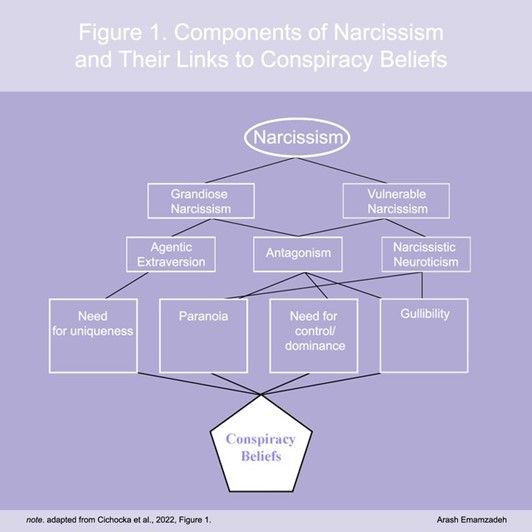Narcissism
The Martyr Complex, Narcissism, and Conspiracy Theorists
Examining the psychology behind some extreme conspiracy theorists.
Posted April 11, 2024 Reviewed by Gary Drevitch
Key points
- Examining martyr complex and narcissistic personality may explain traits of some conspiracy theorists.
- A narcissistic martyr is motivated toward self-sacrificial actions by the desire for praise and admiration.
- The conspiratorial world can entice a narcissistic martyr with a false sense of intellectual courage.
The term martyr complex describes the actions of an individual who consistently engages in self-sacrificial behaviours beyond that which is considered normal or healthy. This often entails regularly working overtime or prioritising others' needs over their own, and usually results in burnout.
What’s different about a narcissistic martyr?
A narcissistic martyr may exhibit similar behaviour; however, their actions are highly calculated, and undertaken by a need for (and expectation of) praise.
While a true narcissist would not willingly engage in self-sacrificing behaviours for the needs of others, they are highly motivated by a desire for the admiration and gratitude. They exaggerate their sense of obligation to suffer or sacrifice for others in order to elicit sympathy, and often deliberately evoke a feeling of guilt from others in the process. They are not a martyr but could be described as regularly ‘playing the martyr’. This has been linked to covert narcissism, as they are constantly oscillating from hero to victim.
What is a conspiracy theorist?
A conspiracy theorist is someone who believes that significant events or situations are the result of, or orchestrated by, secretive plots and powerful groups or individuals. They often think that official information known by the general public is only a fraction of the truth (or is a fabrication altogether). In response, they search for alternative, often complex, explanations for events based on what they perceive as inconsistencies, anomalies, or hidden patterns in the available evidence. They are highly sceptical people, and usually share a generalised distrust of governments, corporations, and other influential entities. However, this scepticism can even extend to the genuine truth, and their search for alternative sources of information often leads them to anecdotal information, misinformation, and unreliable sources. Research shows that conspiracy theorists have less developed critical thinking ability.
The real problem arises when more extreme conspiracy theorists select theories that are:
- beyond controversial
- dismiss and undermine well-established facts of life
- could incite violence and hatred
The link between narcissistic martyrdom and conspiracy theorists
To be clear, not all conspiracy theorists are narcissistic martyrs, or vice versa. Although most conspiracy theorists are genuinely misled by misinformation and chiefly motivated by a deep sense of distrust in society and authority, there are certain aspects of conspiracy theorising that resonate with the selfish desires found in narcissistic martyrs.

What is so alluring about conspiracy theories to a narcissistic martyr?
- Victimhood. By creating or touting secret malevolent plots, the narcissistic martyr is able to exert more control over their own narrative. Unlike others in the real world, they can ‘fight against’ their imagined oppressive force without their imagined oppressive force ever really fighting back. Their enemy is often one which is intangible and can be nowhere and anywhere simultaneously. This serves as a way to avoid responsibility and provides the perfect scapegoat for their own failures or misfortunes.
- Power. For the narcissistic martyr, the allure of uncovering supposed truths and ‘peering behind the curtain’ provides a sense of empowerment and control. Believing they possess knowledge hidden from the public fuels their sense of superiority as they can invalidate and undermine authority. This search for an 'alternative truth' fosters a false sense of enlightenment, allowing them to undermine established authorities and feel intellectually superior. Given their predisposition toward paranoia, narcissists readily embrace these alternative narratives. Furthermore, becoming an expert in a topic that lacks concrete evidence offers an easy way to seem more intelligent than they really are and assert dominance in conversations.
- Attention. Some conspiracy theorists become well-known because of their beliefs, generating a following of similarly distrustful people, garnering infamy, money, and influence. They not only get attention for their ideas but also use them to sway others. Moreover, these figures often profit from their theories through various means, such as selling merchandise or promoting products aligned with their beliefs. Additionally, they may exploit their platform to spread fear and misinformation, amplifying their influence over their audience. So, a narcissistic martyr could see conspiracy theories as a golden opportunity to manipulate others.
Sacrifices of a conspiratorial narcissistic martyr
Conspiracy theorists, driven by an unwavering commitment to their unconventional beliefs, do often find themselves making significant sacrifices. For the narcissistic martyr among them, the allure of being right and proving everyone else wrong eclipses all else, leading them to disregard personal well-being and even risking their livelihoods.
For instance, an outspoken Covid-19 denier could be at risk of:
- Losing their job in a medical profession (and consequently falling into financial hardship)
- Putting themselves at risk by refusing to wear a mask
- Putting their children at risk by refusing to let them get vaccinated
- Damaging relationships with friends and family for continually starting controversial conversations and sharing misinformation
- Damaging their reputation by sharing propaganda online
Paradoxically, this backlash only serves to reinforce their beliefs, further entrenching them in their alternate worldview and distancing them from reality. They will refuse to acknowledge that they are hurting themselves and the people around them, because they will espouse their colossal losses as genuine sacrifices that they are willing to make in order to save the people around them/the world. Their craving to feel like an underdog is a central narrative in their lives, with the hope that enduring persecution will eventually lead to acknowledgement and acclaim. These individuals frequently expose their loved ones to scary ideas, resulting in estrangement from those closest to them, which often reinforces the conspiracy theorists’ sense of uniqueness and intellectual courage.
Conclusion
While the desire for recognition and perceived intelligence is virtually universal, it's crucial to differentiate genuine pursuit of truth from narcissistic manipulation tactics. Bridging the gap between reality and conspiracies isn't easy, leaving loved ones grappling with consequences. Understanding the motivations behind belief in misinformation can help address root causes and foster critical thinking. By encouraging real investigation, we can equip individuals with the tools necessary to evaluate information critically and discern fact from fiction.
References
Cichocka, A. (2022) Why do narcissists find conspiracy theories so appealing? Current Opinion in Psychology


